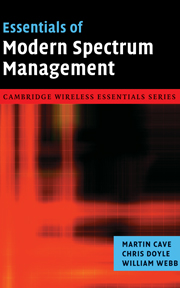Book contents
- Frontmatter
- Contents
- Acknowledgements
- I Emerging problems with the current spectrum management approach
- II Markets
- 4 Market solutions
- 5 Auctions
- 6 Spectrum trading: secondary markets
- 7 Technical issues with property rights
- 8 Economic issues with property rights
- 9 Competition issues relating to spectrum
- 10 Band management
- III Regulation
- IV Conclusions
- Further reading
- Abbreviations
- Author biographies
- Subject index
9 - Competition issues relating to spectrum
Published online by Cambridge University Press: 13 August 2009
- Frontmatter
- Contents
- Acknowledgements
- I Emerging problems with the current spectrum management approach
- II Markets
- 4 Market solutions
- 5 Auctions
- 6 Spectrum trading: secondary markets
- 7 Technical issues with property rights
- 8 Economic issues with property rights
- 9 Competition issues relating to spectrum
- 10 Band management
- III Regulation
- IV Conclusions
- Further reading
- Abbreviations
- Author biographies
- Subject index
Summary
Introduction
Spectrum is an essential input into many services which are highly valuable in both a commercial and public service sense. In Europe it has been estimated that radio spectrum contributes between 2% and 3% of GDP. Public services, such as defence and the emergency services, are usually provided by a public agency and made available free to the population. There is thus no problem over monopolisation leading to excessive pricing. But commercial services are sold into a market, which makes it necessary to oversee that problems of anti-competitive behaviour do not arise.
It follows that, where spectrum is an essential input into a service market such as mobile telephony, a firm which controls the necessary spectrum also controls the downstream service sold to end users. To some extent, there may be non-spectrum-using alternatives to the wireless ones – fixed line calls instead of mobile calls and cable television instead of terrestrial or satellite broadcasting. But in many cases either these services are not good substitutes for the wireless ones, as fixed calls are not always a good substitute for mobile calls, or the relevant competing platform, such as cable TV, may simply not exist.
Figure 9.1 shows the role of spectrum in the value chain, based upon the examples of mobile communications and broadcasting. It shows, in particular, that competition in the provision of services to end users can be inserted into the value chain at other points than by licensing spectrum to several operators – for example by the intervention of mobile virtual network operators (MVNOs), or by allowing a firm to “resell” a mobile operator's call minutes.
- Type
- Chapter
- Information
- Essentials of Modern Spectrum Management , pp. 139 - 150Publisher: Cambridge University PressPrint publication year: 2007

